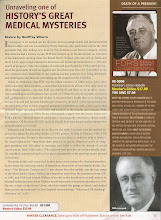This report comes from an oral history taken for the Herbert Hoover Presidential Library on December 1, 1969 of Walter S. Robertson, a senior offiical in the state department. The document is 28 pages in length. The following begins of page 24:
"I had been out in Australia for two years and I was coming home to go over to the State Department, and I went by to tell him (General Douglas MacArthur) goodby. I haven't seen this in print anywhere. The man who collected General MacArthur's papers probably doesn't know it ever existed. I'm telling you of a personal conversation I had with him on August 1, 1944. As I went in he greeted me and said. "You can't guess where I've been." He said, "I've just come back from a meeting with the President in Honolulu." It was a secret meeting, it later came out. He said: "He asked me to come to meet him there, and I hadn't seen Franklin Roosevelt for X-number of years" -- I forget how many -- he had been out in the Phillippines and then down to Australia. And he sais, "I was so shocked when I saw him. He's a doomed man." He said: "Before, he was this dominant personality that dominated every conference he was in." He said: He sat there, and his head bobbed up and down, and his mouth sort of hung open. Admiral Leahy was his aide, and we talked." However, I don't think I'll put on the record what he said. And he said "You can't guess what he wanted of me," and then he told me. But then he went on to say: "If he lives until November, he will be elected President of the United Sttaes, but whoever is elected the Vice President of the United States will serve his term. He's an ill man and don't you be surprised to hear of his death at any moment," But Roosevelt did go back, he went to his doctors and they said he was all right, and he ran. Then when they inaugurated him in January they propped him up -- the doctors saying he was all right. He was inaugurated in January and was dead in April. But Douglas MacArthur told me in his office in August '44 not to be surprised at his death at any moment. I'll tell you off the record -- I won't put in on tape -- what it was the President . . . (machine turned off)
This is but one of dozens of similar accounts, though perhaps one of the most graphic and one of the earliest, of the degree of medical problems FDR was experiencing. This is the first account I've seen of MacArthur's comments from his meeting with FDR in Honolulu.
To recount, other graphic reports of his seizures come from: Anna Roosevelt Halsted, Frances Perkins, Senator Frank Maloney, future NYT editor Turner Catledge, to mention only a few.
As stated in the book, these seizures most probably came from a stroke as a consequence of vascular disease. The visual deficit seen after January 1945 was more probably related to a brain metastasis from melanoma as was the fatal brain hemorrhage on April 12th 1945.
I will leave it to you to judge the impact of these astounding findings on the course of history.
Subscribe to:
Post Comments (Atom)





No comments:
Post a Comment